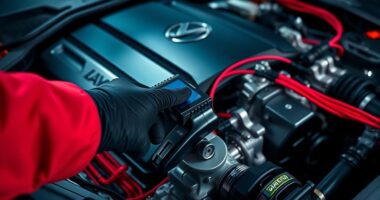Upgrading the differential in your Lexus RC F or GS F boosts traction, handling, and cornering precision. Improvements like limited-slip or torque-vectoring differentials help distribute power effectively during aggressive driving or on tricky surfaces. To maximize performance, consider upgrading your cooling systems, choosing compatible parts, and installing high-quality gear oils. Performance packages also enhance power and responsiveness. Keep an eye on maintenance and common issues—your vehicle’s performance depends on it. Continue to explore ways to optimize your drive.
Key Takeaways
- Upgrading to high-performance limited-slip or torque vectoring differentials enhances traction, cornering, and handling in Lexus RC F and GS F models.
- Ensure compatibility by verifying OEM part numbers (e.g., 4110029005) and sourcing genuine components from authorized dealers.
- Regular differential fluid changes with quality gear oils like Amsoil Severe Gear improve durability and performance.
- Incorporate cooling system upgrades such as high-capacity radiators and enhanced airflow to prevent overheating during aggressive driving.
- Upgrading differential components often complements suspension and tuning modifications for optimal vehicle dynamics and stability.
Understanding the Role of Differentials in Lexus RC F and GS F
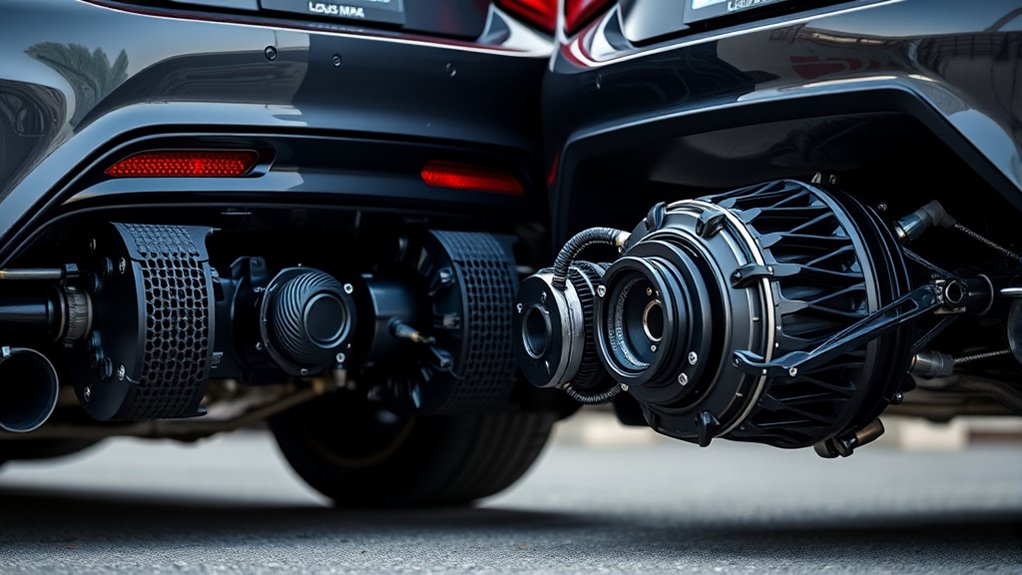
Understanding the role of differentials in the Lexus RC F and GS F is essential to appreciating how these high-performance cars achieve their exceptional handling and traction. The Torque Vectoring Differential (TVD) actively shifts power between rear wheels to enhance cornering stability and grip. It uses clutch packs, planetary gears, and electronic actuators to manage side-to-side torque, improving responsiveness during aggressive driving. The Final Drive Unit (FDU) houses the differential and axles within a durable design that withstands the high torque from the V8 engines. Electronic control systems monitor wheel speed, steering, and throttle to adjust torque distribution dynamically, optimizing performance in various driving modes. These components work together to reduce understeer, improve acceleration, and ensure precise handling, especially during spirited driving or track use. Additionally, cultural references in automotive engineering highlight the importance of innovative technologies in achieving a driving experience that balances power, control, and safety. Incorporating advanced differential technology allows for more precise control of torque distribution, enhancing overall vehicle performance and safety features. Modern automotive control systems further refine this process by continuously adapting to changing driving conditions, ensuring maximum efficiency and safety. This integrated approach exemplifies how dynamic torque management contributes to a balanced and responsive driving experience. Moreover, ongoing advancements in AI-driven safety systems are helping to further optimize vehicle dynamics in real-time.
Benefits of Upgrading Your Differential System

Upgrading your differential system offers significant benefits that enhance your Lexus RC F or GS F’s overall driving experience. You’ll notice improved traction and stability, especially during aggressive cornering or on uneven surfaces, thanks to torque vectoring that actively manages wheel power. This reduces understeer and oversteer, keeping your vehicle more balanced and predictable. Enhanced cornering precision lets you take tight turns with less steering effort and earlier throttle application, making your drive more responsive and nimble. Upgraded differentials also optimize power delivery, handling increased torque from mods and preventing wheel hop during hard launches. They are built for durability under stress, with high-quality components that withstand track conditions. Plus, adjustable settings give you control over bias and lock rates, tailoring performance to your driving style or track requirements. Additionally, understanding regional legal resources can help you make informed decisions about modifications and upgrades. Implementing these improvements can also contribute to better vehicle safety by ensuring more reliable handling in various driving scenarios. Moreover, performance tuning of the differential can further refine handling characteristics to match your specific driving needs. Considering maintenance practices ensures your upgraded differential continues to perform optimally over time.
Cooling System Enhancements for Optimal Performance
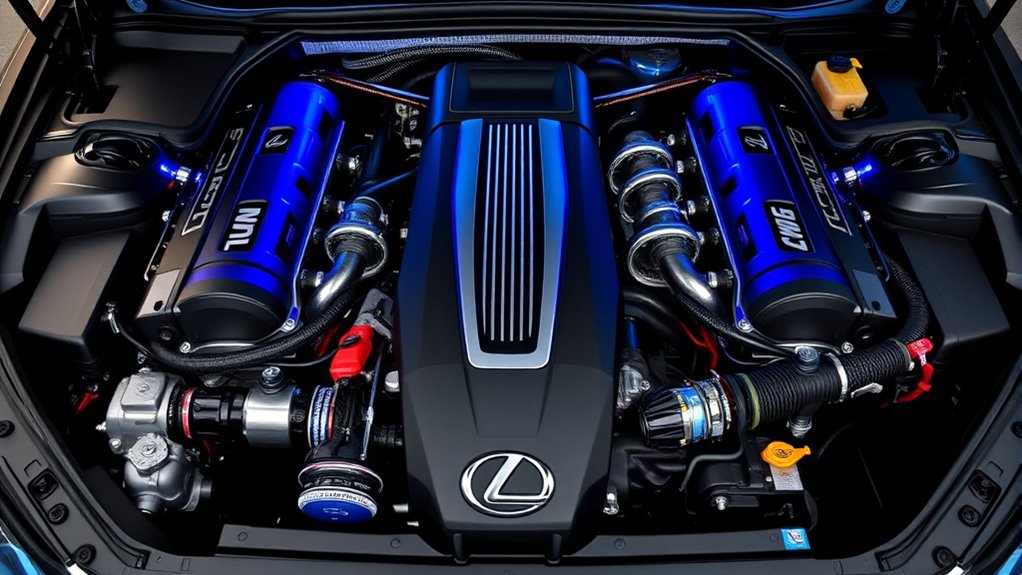
Enhancing your Lexus RC F or GS F’s cooling system is essential for maintaining peak performance, especially during aggressive driving or track sessions. Upgrading components like silicone radiator hoses improve durability and resistance to high temperatures. Better radiator caps help sustain higher pressures, boosting cooling efficiency. High-performance radiators, fans, and shrouds increase heat dissipation, preventing overheating. Using advanced coolants and sensors ensures ideal temperatures and real-time monitoring. Proper airflow design and strategic component placement optimize heat transfer and reduce thermal stress. Incorporating coolant selection strategies can further enhance the cooling system’s effectiveness by preventing corrosion and ensuring optimal thermal transfer. Additionally, integrating real-time monitoring systems can provide immediate feedback on system performance, allowing for proactive adjustments to prevent overheating. Selecting high-quality materials for all components can also extend the lifespan of your cooling system and maintain consistent performance over time, especially when combined with tuning to improve overall vehicle efficiency and durability.
Selecting and Installing Replacement Differential Parts
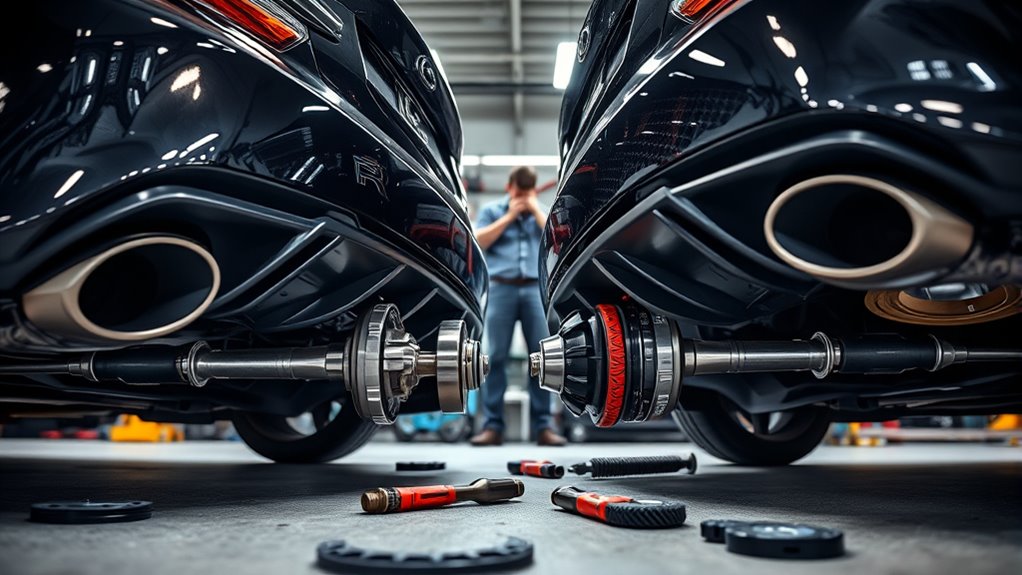
Choosing the right replacement differential parts for your Lexus RC F or GS F guarantees your vehicle maintains its performance and reliability. First, verify compatibility by using OEM part number 4110029005, which fits 2015-2019 RC F and 2016-2020 GS F models. Second, inspect signs like gear whine, clunking, or bearing wear to determine if replacement is necessary. Third, source genuine parts through dealerships or authorized distributors like Rallye Lexus for quality assurance. When selecting aftermarket options, consider direct replacement units or upgraded LSD components. Proper installation is critical; use specialized tools such as dial indicators and hydraulic presses, and ensure proper torque and shimming to prevent issues like premature wear or gear whine. Additionally, understanding merchant services can help facilitate secure payments when ordering parts online. Ensuring that the installation process adheres to correct procedures is essential to avoid future mechanical problems. Properly calibrated tools and technical expertise are vital to achieve optimal results during installation. Investing in professional installation can save time and prevent costly errors, especially given the complexity of differential assembly.
Performance Packages for Enhanced Power and Handling

If you want to boost your Lexus RC F or GS F’s power and handling, performance packages offer an all-encompassing solution. Engine and exhaust upgrades, like those from RR Racing, enhance power by improving exhaust flow and header performance. Stage 1 tuning from Delicious Tuning increases horsepower and torque, especially with high-octane fuel. Transmission enhancements, such as Sport S modes, make shifts more responsive, while custom engine tuning maximizes performance with minimal modifications. Upgraded exhaust systems boost power and sound. Handling benefits from torque vectoring differentials, suspension adjustments, and steering enhancements, all tailored to improve stability and agility. These packages are tested on street and track conditions, providing a balanced, high-performance driving experience. Expect costs like $9,000 for premium upgrades, designed specifically for your Lexus model. Additionally, understanding performance tuning laws can help ensure your modifications remain legal and effective. Being aware of merchant services regulations can also protect your investment when making online transactions related to vehicle upgrades or purchasing parts. Incorporating advanced suspension components can further elevate your vehicle’s handling capabilities, ensuring optimal performance across diverse driving scenarios. Moreover, selecting preppy dog names for your pet can reflect a refined taste that complements the sophistication of your vehicle upgrades. Considering the importance of quality assurance can ensure that the modifications are reliable and meet safety standards.
Recognizing Common Differential Issues and Maintenance Tips
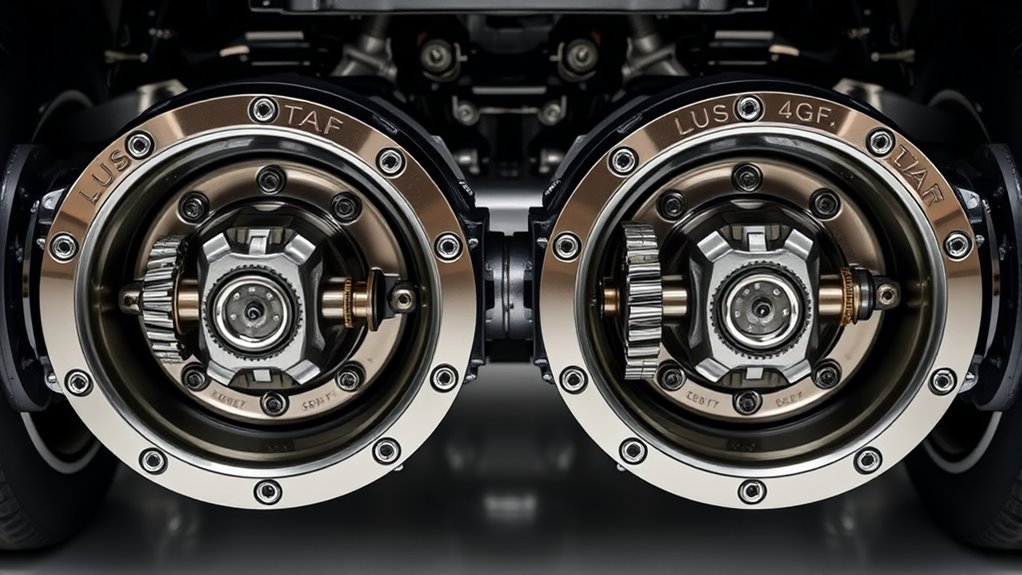
Recognizing common differential issues is essential for maintaining your Lexus RC F or GS F’s performance and reliability. If you notice loud clunking sounds during highway cruising, difficulty maintaining traction during aggressive turns, or unusual whining noises from the rear axle, your differential may be failing. Additionally, vibrations through the chassis during steady driving or warning lights related to stability control can signal problems. To prevent major failures, follow these maintenance tips:
- Change differential fluid every 30k-60k miles with quality gear oil like Amsoil Severe Gear.
- Inspect axle seals and differential mounts regularly for leaks or damage.
- Monitor fluid condition for discoloration or metal particles, and replace promptly if contamination occurs. Regular inspection of the differential components can help identify problems early and extend component lifespan.
- Developing a maintenance routine that includes regular inspections can help identify problems early and extend component lifespan. Incorporating differential fluid analysis can also provide early warnings of wear or contamination, helping you address issues before they become costly repairs.
Timely maintenance helps avoid costly repairs and ensures your vehicle’s longevity.
How Differential Upgrades Impact Vehicle Dynamics
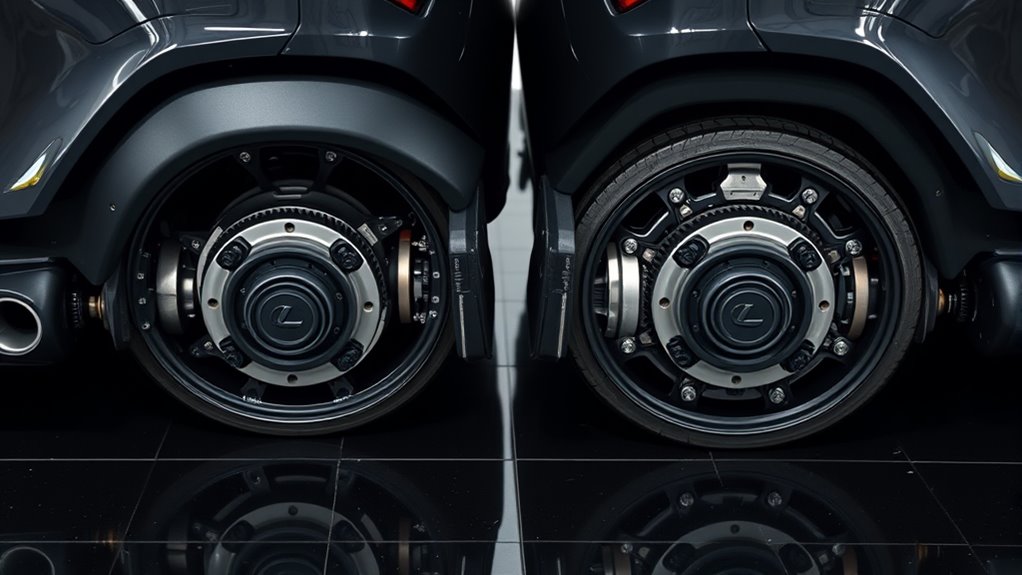
Differential upgrades play a crucial role in shaping your vehicle’s overall handling and stability. They improve cornering precision by allowing wheels to rotate at different speeds during turns, which enhances stability and responsiveness. Systems like limited-slip differentials distribute power more effectively, reducing understeer and ensuring traction is proportional to road conditions. This results in better steering response and smoother maneuvers. Upgraded differentials also boost traction by directing power to wheels with better grip, especially on slippery surfaces, increasing confidence in adverse conditions. They enhance stability at high speeds and off-road, helping your vehicle stay balanced on uneven terrain. Overall, differential upgrades optimize vehicle dynamics, providing better control, safety, and performance across diverse driving scenarios.
Frequently Asked Questions
What Is the Typical Lifespan of a Lexus Differential Before Upgrade?
You’re wondering about the typical lifespan of your Lexus differential before considering an upgrade. Generally, with proper maintenance, a Lexus differential lasts between 150,000 to 200,000 miles. However, severe driving conditions or neglect can shorten this. Regular fluid changes with OEM or high-quality synthetic oils help prolong its life, while monitoring for warning signs like noise or leaks ensures you catch issues early before needing an upgrade.
How Does a Vectoring Differential Improve Cornering Specifically?
Ever wonder how some cars corner so smoothly? A vectoring differential improves cornering by actively distributing torque to wheels that need more grip. It responds quickly to your steering inputs, reducing understeer and oversteer. This enhances stability and control, especially during sharp turns. By optimizing torque delivery, it helps your vehicle match your driving intentions, making every turn more precise and confident.
Are Differential Cooling Upgrades Necessary for Daily Driving?
You might wonder if differential cooling upgrades are necessary for daily driving. Since your normal commute involves limited high-load conditions, the factory cooling system usually handles heat effectively. The upgrade is mainly for track use or aggressive performance driving, where sustained high temperatures can cause wear. For everyday driving, these enhancements offer little benefit and might not justify the cost, as OEM systems already provide adequate protection.
Can I Install Performance Differential Parts Myself?
You can install performance differential parts yourself if you have the right tools and technical skills. You’ll need hydraulic lifts, bearing pullers, specialized wrenches, and precise torque measurements. Keep in mind, this job involves complex disassembly, gear pattern analysis, and preload adjustments. If you’re inexperienced, it’s best to consult a professional, as improper installation can cause serious damage and void warranties. Safety and accuracy are key.
What Are the Signs That Indicate a Differential Upgrade Is Needed?
Your vehicle’s differential is like its heartbeat—if it’s sending warning signals, you can’t overlook them. You’ll notice whining noises, vibrations, or difficulty turning, which point to issues needing attention. Burning smells, leaks, or uneven tire wear also signal trouble. If you’re pushing your car hard or noticing these signs, it’s time for an upgrade. A stronger, more reliable differential ensures your ride stays smooth and safe under pressure.
Conclusion
So, after all that talk about upgrading your Lexus RC F and GS F’s differentials, you might think it’s just a small tweak. But ironically, it could be the difference between a smooth, confident ride and a costly mishap. While you chase those extra horses and sharper handling, don’t forget that sometimes, the simplest upgrade can make the biggest impact. Because in performance, it’s often the little things that keep you from losing it all.






